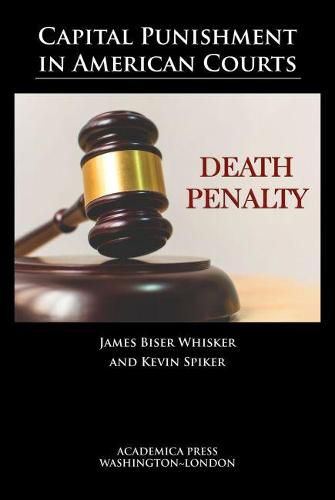Readings Newsletter
Become a Readings Member to make your shopping experience even easier.
Sign in or sign up for free!
You’re not far away from qualifying for FREE standard shipping within Australia
You’ve qualified for FREE standard shipping within Australia
The cart is loading…






This title is printed to order. This book may have been self-published. If so, we cannot guarantee the quality of the content. In the main most books will have gone through the editing process however some may not. We therefore suggest that you be aware of this before ordering this book. If in doubt check either the author or publisher’s details as we are unable to accept any returns unless they are faulty. Please contact us if you have any questions.
In the 400 years since the first known execution was carried out for treason in Virginia, American jurisdictions have debated both the appropriateness and methods of capital punishment. Over that time, courts have placed varying restrictions on its application, excluding categories of citizens (for example the insane or the underaged) and evaluating and excluding methods of execution by the U.S. Constitution’s prohibition on cruel and unusual punishment. Critics have highlighted controversial issues, including race and class, to argue against capital punishment’s perceived uneven application. Others have argued that capital punishment is cruel and unusual in any form and should be outlawed altogether.
Most recently, the U.S. Supreme Court has ruled, in a 5-4 bare majority, that capital punishment is not cruel and unusual for the crime of murder, provided certain factors are also present. In the same decision it held that infliction of pain of during an execution did not bar its application. States remain free to employ the death penalty or not, and if so, choose freely the method each state deems most appropriate.
In Capital Punishment in American Courts, distinguished political scientists James B. Whisker and Kevin R. Spiker survey this history from a penetrating new perspective.
$9.00 standard shipping within Australia
FREE standard shipping within Australia for orders over $100.00
Express & International shipping calculated at checkout
This title is printed to order. This book may have been self-published. If so, we cannot guarantee the quality of the content. In the main most books will have gone through the editing process however some may not. We therefore suggest that you be aware of this before ordering this book. If in doubt check either the author or publisher’s details as we are unable to accept any returns unless they are faulty. Please contact us if you have any questions.
In the 400 years since the first known execution was carried out for treason in Virginia, American jurisdictions have debated both the appropriateness and methods of capital punishment. Over that time, courts have placed varying restrictions on its application, excluding categories of citizens (for example the insane or the underaged) and evaluating and excluding methods of execution by the U.S. Constitution’s prohibition on cruel and unusual punishment. Critics have highlighted controversial issues, including race and class, to argue against capital punishment’s perceived uneven application. Others have argued that capital punishment is cruel and unusual in any form and should be outlawed altogether.
Most recently, the U.S. Supreme Court has ruled, in a 5-4 bare majority, that capital punishment is not cruel and unusual for the crime of murder, provided certain factors are also present. In the same decision it held that infliction of pain of during an execution did not bar its application. States remain free to employ the death penalty or not, and if so, choose freely the method each state deems most appropriate.
In Capital Punishment in American Courts, distinguished political scientists James B. Whisker and Kevin R. Spiker survey this history from a penetrating new perspective.